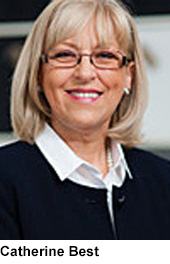Publication affirmed her belief that she COULD write.

Encouragement from other nurses helped empower her transition from staff nurse to specialist community public health nurse to nurse academic and, ultimately, to nurse writer.
 In a world where nursing is global and the need for quality nurse leaders has never been more evident—and as 2020 becomes the Year of the Nurse and Midwife—there is much for the nursing profession and me, personally, to celebrate.
In a world where nursing is global and the need for quality nurse leaders has never been more evident—and as 2020 becomes the Year of the Nurse and Midwife—there is much for the nursing profession and me, personally, to celebrate.
I am extremely proud to have been awarded Phi Mu Chapter’s Research and Practice Development Award–Innovation in Nurse Education. It helps me communicate information about an important project I’m working on at both national and international conference levels and in peer-reviewed publications. Scholarships play an important role in enhancing delivery of evidence-based, safe, and effective care and in disseminating information about innovative practice. In receiving this scholarship, I was reminded of the support I have had from others throughout my long, often challenging, but rewarding career in nursing.
I am fortunate to have worked with some highly skilled nurses and nurse educators who had an unyielding belief in my ability to succeed, even when I didn’t always believe in myself. Their encouragement helped empower my transition from staff nurse to specialist community public health nurse to nurse academic and, ultimately, to nurse writer, an option I never imagined possible.
Having my first paper published without changes—it was co-authored with a nurse academic—affirmed my personal belief that I could write. Its publication provided an opportunity to share my learning with a wider audience, demonstrated my ability to succeed in academia, and helped raise the profile of professional nursing practice.
As my success grew, I began to explore other avenues for writing, opening up an eclectic arena of further opportunities, including writing for specialist journals, blogging, and conference proceedings. Identifying avenues available to emerging writers is one of the most important aspects of beginning one’s journey to publication. This was perhaps no more evident than when I was accepted to participate in the Celebrating Nursing Practice project, part of the Royal College of Nursing Centenary Year of 2016. The aim of the project is to establish a library of good practice information to celebrate the very best of the profession and to reveal nursing practices that often go unobserved.
My project, which was based on developing a Writing for Publication workshop, was accepted, the findings of which were published along with a personal blog in 2018. With these successes, my self-assurance soared, making me more confident when I submitted my application for the Phi Mu Chapter award. This confidence will likely open up further opportunities in the future.
A financial scholarship can make the journey to publication and innovation dissemination so much easier. Nurses who struggle to pay bills may regard funding of conference attendance a luxury—for many, beyond their personal ability to pay. Lack of funds should not limit dissemination of information about new ideas, however, because support is available. The more nurses write, present their work, and share innovations in practice, the stronger nursing’s voice becomes. It’s likely that such nurses will also be considered as the future leaders we so desperately need.
Nurses today have opportunities to share their views, ideas, and opinions using a variety of platforms. Social media can be utilized to celebrate the unique contributions that nurses make—not only clinically but also through research, academic management, and leadership. Such communication can serve as a catalyst for positive change—for nurses and the patients they serve. RNL
Catherine Best, MSc, PGCert (HPE), BEd (Hons), RN, SCPHN (OH), NMC Teacher, Queen’s Nurse, is an honorary visiting lecturer in nursing at the University of Bradford, West Yorkshire, United Kingdom. She was awarded the title of Queen’s Nurse by the Queen’s Nursing Institute in 2012, an award that recognizes excellence in clinical nursing practice.